

Robert Dur
Key publications

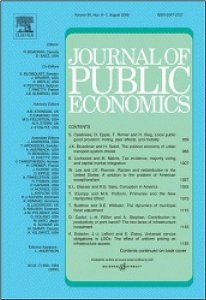
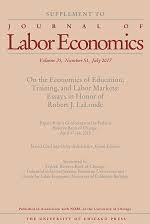
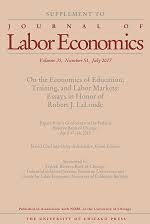
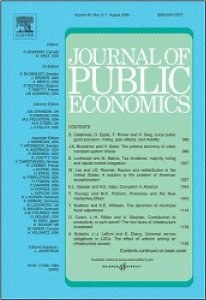
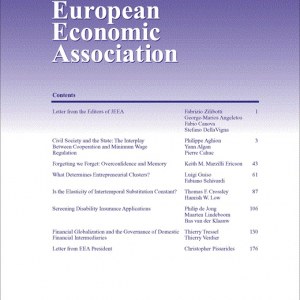
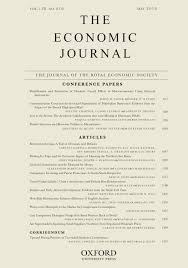
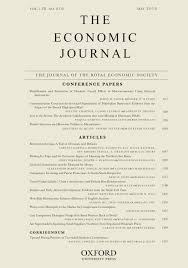
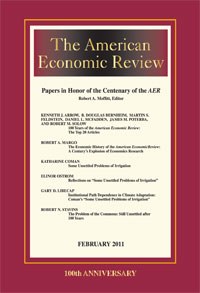
List of publications
Bastiaans, M., Dur, R. and Gielen, \AnneC.\ (2024). Activating the long-term inactive: Labor market and mental health effects Labour Economics, 90:.
Cotofan, M., Dur, R. and Meier, S. (2024). Does growing up in economic hard times increase compassion? The case of attitudes towards immigration Journal of Economic Behavior and Organization, 218:245--262.
Cotofan, M., Cassar, L., Dur, R. and Meijer, S. (2023). Macroeconomic Conditions When Young Shape Job Preferences for Life Review of Economics and Statistics, 105(2):467--473.
Dur, R., Fleming, D., \Van Garderen\, M. and \Van Lent\, M. (2021). A Social Norm Nudge to Save More: A Field Experiment at a Retail Bank Journal of Public Economics, 200:.
Buurman, M., Delfgaauw, J., Dur, R. and Zoutenbier, R. (2020). When Do Teachers Respond to Student Feedback? Evidence from a Field Experiment Labour Economics, 65:.
Dur, R. and Schmittdiel, H. (2019). Paid to Quit De Economist, 167(4):1--20.
Dur, R. and Vollaard, B. (2019). Salience of law enforcement: A field experiment Journal of Environmental Economics and Management, 93:208--220.
Dur, R. and Lent, M. (2018). Serving the Public Interest in Several Ways: Theory and Empirics Labour Economics, 51:13--24.
Delfgaauw, J., Dur, R., Non, J. and Verbeke, W. (2015). The Effects of Prize Spread and Noise in Elimination Tournaments: A Natural Field Experiment Journal of Labor Economics, 33(3):521--569.
Dur, R. and Tichem, J. (2015). Altruism and Relational Incentives in the Workplace Journal of Economics and Management Strategy, 24(3):485--500.
Dur, R. and Zoutenbier, R. (2015). Intrinsic Motivation of Public Sector Employees: Evidence for Germany German Economic Review, 16(3):343--366.
Dahm, M., Dur, R. and Glazer, A. (2014). How a Firm Can Induce Legislators to Adopt a Bad Policy Public Choice, 159(1-2):63--82.
Delfgaauw, J., Dur, R., Non, J. and Verbeke, W. (2014). Dynamic Incentive Effects of Relative Performance Pay: A Field Experiment Labour Economics, 28:1--13.
Delfgaauw, J., Dur, R., Sol, \.(. and Verbeke, W. (2013). Tournament Incentives in the Field: Gender Differences in the Workplace Journal of Labor Economics, 32(2):305--326.
Dur, R. and \van der Weele\, J. (2013). Status-Seeking in Criminal Subcultures and the Double Dividend of Zero-Tolerance Journal of Public Economic Theory, 15(1):77--93.
Buurman, M. and Dur, R. (2012). Incentives and the Sorting of Altruistic Agents into Street-Level Bureaucracies The Scandinavian Journal of Economics, 114(4):1318--1345.
Buurman, M., Delfgaauw, J., Dur, R. and \Van den Bossche\, S. (2012). Public Sector Employees: Risk Averse and Altruistic? Journal of Economic Behavior and Organization, 83(3):279--291.
Delfgaauw, J. and Dur, R. (2010). Managerial Talent, Motivation, and Self-selection into Public Management Journal of Public Economics, 94(9-10):654--660.
Dur, R. and Glazer, A. (2010). Editorial introduction Economics of Governance, 11(1):1--2.
Dur, R., Non, J. and Roelfsema, H. (2010). Reciprocity and Incentive Pay in the Workplace Journal of Economic Psychology, 31(4):676--686.
Dur, R. and Roelfsema, H. (2010). Social Exchange and Common Agency in Organizations Journal of Socio-economics, 39(1):55--63.
Dur, R. and Sol, J. (2010). Social interaction, co-worker altruism, and incentives Games and Economic Behavior, 69(2):293--301.
Delfgaauw, J. and Dur, R. (2009). From Public Monopsony to Competitive Market: More Efficiency but Higher Prices Oxford Economic Papers, 61(3):586--602.
Dur, R. (2009). Gift Exchange in the Workplace: Money or Attention? Journal of the European Economic Association, 7(2-3):550--560.
Delfgaauw, J. and Dur, R. (2008). Incentives and Workers: Motivation in the Public Sector Economic Journal, 118(525):171--191.
Dur, R. and Staal, \.(. (2008). Local Public Good Provision, Municipal Consolidation, and National Transfers Regional Science and Urban Economics, 38(2):160--173.
Dur, R. and Glazer, A. (2008). Optimal Contracts When a Worker Envies His Boss Journal of Law, Economics, and Organization, 24(1):120--137.
Dur, R. and Glazer, A. (2008). Subsidizing Enjoyable Education Labour Economics, 15(5):1023--1039.
Dur, R. and Glazer, A. (2008). The Desire for Impact Journal of Economic Psychology, 29(3):285--300.
Glazer, A. and Dur, R. (2008). Editorial announcement Economics of Governance, 9(2):101.
Beniers, \.(. and Dur, R. (2007). Politicians' motivation, political culture, and electoral competition International Tax and Public Finance, 14:29--54.
Delfgaauw, J. and Dur, R. (2007). Signaling and screening of workers' motivation Journal of Economic Behavior and Organization, 62:605--624.
Dur, R. and Swank, O. (2005). Producing and Manipulating Information Economic Journal, 115:185--199.
Dur, R. and Roelfsema, H. (2005). Why Does Centralisation Fail to Internalise Policy Externalities? Public Choice, 122(3/4):395--416.
Dur, R., Teulings, \.(. and Rens, T. (2004). Should higher education subsidies depend on parental income? Oxford Review of Economic Policy, 20(2):284--397.
Dur, R. (2001). Explaining unemployment trends in the Netherlands Journal of Policy Modeling, 23(2):161--168.
Dur, R. (2001). The credibility problem in unemployment insurance policy Journal of Institutional and Theoretical Economics, 157(4):634--650.
Dur, R. (2001). Wage-setting institutions, unemployment, and voters' demand for redistribution policy Scottish Journal of Political Economy, 48(5):517--531.
Swank, O. and Dur, R. (2001). Why do policy makers give (permanent) power to policy advisers? Economics and Politics, 13(1):73--93.
Dur, R. (2001). Why do policy makers stick to inefficient decisions? Public Choice, 107(3/4):221--234.
Dur, R. (1999). Mismatch between unemployment and vacancies in the Dutch labour market Applied Economics, 31(2):237--244.
Swank, O., Peletier, B. and Dur, R. (1999). Voting on the budget deficit: comment American Economic Review, (89):1377--1381.
Dur, R. and Swank, O. (1998). The role of governmental agreements in breaking political deadlock European Journal of Political Economy, 14(3):561--572.